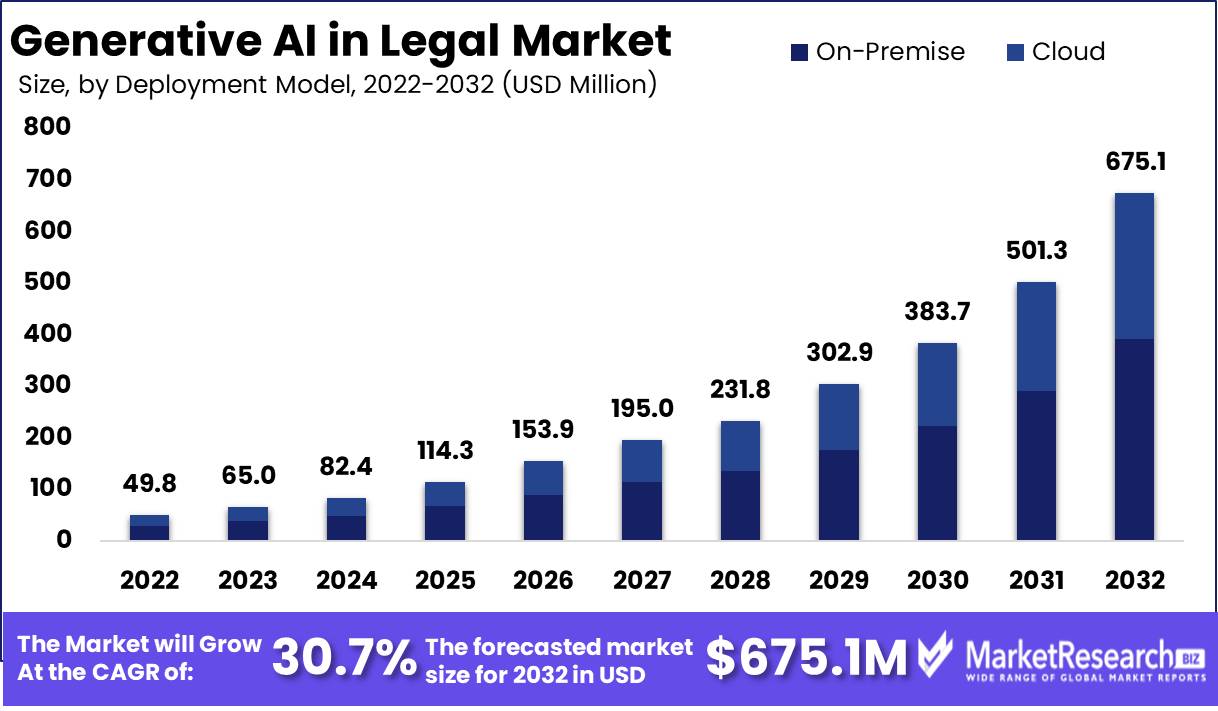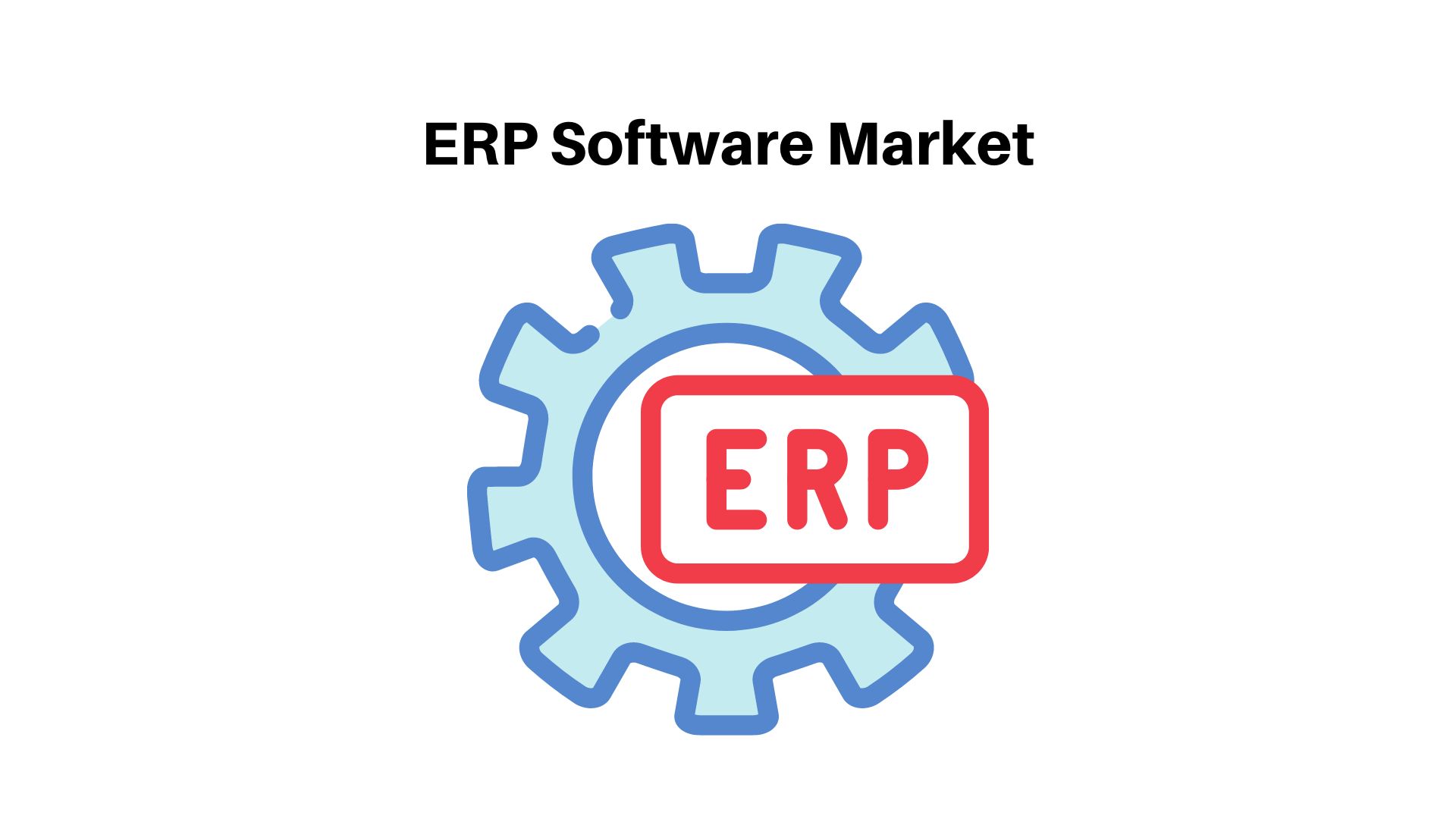Generative AI in Legal Market Hit USD 675.1 Mn by 2032

Page Contents
Market Overview
Published Via 11Press : Generative AI in Legal Market size is expected to be worth around USD 675.1 Mn by 2032 from USD 49.8 Mn in 2022, growing at a CAGR of 30.7% during the forecast period from 2023 to 2032.
Generative AI, also known as artificial intelligence that creates original and unique content, has gained significant adoption across industries – including legal services. Here we explore its use within legal services as well as its advantages, drawbacks, and possible repercussions.
Generative AI offers promising applications in legal market applications like contract analysis, legal research and document generation. Thanks to its ability to process large volumes of legal documents quickly and analyze them efficiently, generative AI algorithms can assist lawyers in quickly finding relevant information, extracting key clauses and offering insights that speed legal research – thus drastically decreasing review time and effort required for complex legal documents.
One of the primary advantages of generative AI in the legal market is its potential to enhance legal drafting. By employing language models and natural language processing techniques, generative AI can assist lawyers with producing contracts, pleadings, or any other legal documents more quickly and with reduced likelihood of errors or omissions; leaving more time for strategic considerations like negotiation. AI will take over routine drafting tasks so lawyers can focus on higher level tasks instead.
However, adopting generative AI into the legal market presents both ethical and practical considerations. Ensuring accuracy and reliability in AI-generated content for legal documents requires precision and adherence to specific legal principles; bias detection and mitigation tools must also be in place so as not to perpetuate existing biases present in legal texts; additionally maintaining data privacy and confidentiality are paramount when using generative AI as legal documents often contain sensitive or confidential information.
Concerns exist around the potential effect of generative AI on the job market for lawyers. While AI can augment and streamline legal workflows, there may be fears about job displacement. Many legal professionals believe generative AI could free their time up for higher-value tasks and personalized client service, thus leading to an evolutionary shift rather than job displacement.
Regulated and ethical frameworks must be created in order to control the use of generative AI in legal markets, taking into account accountability, transparency, and explainability issues associated with AI systems. Legal practitioners and policymakers must collaborate together in ensuring that AI technologies are deployed responsibly while abiding by legal and ethical requirements.
Request Sample Copy of Generative AI in Legal Market Report at: https://marketresearch.biz/report/generative-ai-in-legal-market/request-sample

Key Takeaways
- Generational AI offers legal market professionals increased efficiency and accuracy in tasks like contract analysis and legal research.
- Automation software offers lawyers the potential to automate routine legal drafting tasks and focus on higher-level strategic work.
- Accuracy, reliability and bias mitigation should always be key considerations when using generative AI in legal fields.
- Data privacy and confidentiality must be observed when creating legal documents using AI technology.
- Generative AI may alter the nature of legal work, freeing up lawyers for more personalized client service.
- Establishing regulatory and ethical frameworks are crucial to the effective use of AI technologies in legal markets.
- Accountability, transparency, and explainability must be prioritized to mitigate concerns related to AI use in legal processes.
- Implementation of generative AI can transform legal workflows, but its implementation must involve collaboration between legal practitioners and policymakers for it to succeed.
Regional Snapshot
North America and specifically the United States has been at the forefront of adopting AI into legal practices, leading to several legal tech companies from Silicon Valley and other major cities using this form of intelligence for contract analysis, legal research and document generation solutions.
Europe has made significant strides toward employing artificial intelligence (AI) within legal systems, especially countries like Great Britain, Germany and France where legal tech startups using AI algorithms for contract management and due diligence processes have emerged.
Asia-Pacific countries are witnessing rapid expansion in the use of artificial intelligence technologies within legal practice. Singapore, China and Japan are investing in these solutions to streamline operations, increase efficiency and facilitate access to justice.
Generative AI adoption in Latin America's legal market is increasing quickly. Countries such as Brazil and Mexico are witnessing the emergence of legal tech startups offering AI-powered solutions for contract analysis, legal research, document generation, document storage and management, etc.
For any inquiries, Speak to our expert at: https://marketresearch.biz/report/generative-ai-in-legal-market/#inquiry
Drivers
Generative AI holds great promise to increase efficiency and productivity within legal workflows. By automating repetitive tasks such as contract analysis and document production, lawyers can focus their attention on higher-value work that leads to increased productivity and quicker turnaround times.
- Cost Reduction: Implementing generative AI can lead to cost reduction for law firms and legal departments by automating repetitive tasks, thus decreasing manual labor needs while reallocating resources more effectively.
- Enhance Accuracy: Generative AI algorithms have the capacity to analyze vast quantities of legal data with greater accuracy, extracting relevant information with greater efficiency than manual methods, thus helping reduce errors and enhance legal work quality.
- Advanced Legal Research: Generative AI can assist lawyers in conducting comprehensive legal research by quickly analyzing and extracting insights from large volumes of legal texts, case law and precedents. This allows lawyers to more efficiently access relevant information and make well-informed decisions.
Restraints
Ethical and Legal Considerations: Generative AI raises ethical and legal considerations that include transparency, accountability and fairness in decision-making processes. Robust regulatory frameworks should exist to address such considerations and promote responsible AI use within legal sectors.
- Data Quality and Bias: Generative AI models depend heavily on training data to produce results, so any inaccuracies or bias in that information could lead to inaccurate or biased outcomes. Therefore, it is crucial that AI training data be comprehensive, diverse, and representative so as not to perpetuate existing biases or produce unreliable results.
- Privacy and Confidentiality: Legal documents often contain sensitive and confidential data that must be protected in order to implement generative AI successfully. Implementation requires strict data privacy measures in order to maintain client confidentiality as well as comply with data protection regulations, so ensuring data security throughout AI lifecycle development poses a formidable challenge.
Opportunities
Contract Analysis and Management: Generative AI can simplify contract analysis by automatically recognizing key clauses, notifying of potential risks, and summarizing contracts. Additionally, Generative AI enables efficient contract management by tracking expiration dates, renewals, and obligations efficiently.
- Document Generation: Generative AI can automate the generation of legal documents such as contracts, pleadings, and legal briefs – saving both time and effort in producing accurate yet customized documents – increasing efficiency when document preparation occurs.
- Legal Research and Due Diligence: Generative AI can aid lawyers in conducting in-depth legal research and due diligence by analyzing large volumes of legal documents, case law and regulatory information. This enables them to quickly locate relevant precedents, assess risks accurately and make more informed decisions.
Take a look at the PDF sample of this report: https://marketresearch.biz/report/generative-ai-in-legal-market/request-sample
Challenges
Interpretability and Explainability: Generative AI models often serve as black boxes, producing output without offering clear explanations or justifications of their decisions. This lack of interpretability and explainability may hinder its adoption within legal industry applications where transparency and understanding are critical components.
- Integration of Generative AI: Integrating Generative AI into legal workflows requires effective human-AI collaboration. Lawyers must know how to work with AI systems, interpret their outputs and make informed decisions based on insights generated by them; developing these necessary skills as well as creating workflows which integrate human expertise with AI capabilities can be difficult challenges.
- Regulation and Compliance Complicatedness: The legal market is highly regulated, making adoption of generative AI solutions potentially more complex in terms of complying with existing regulations. Legal professionals need to navigate this regulatory landscape to ensure AI solutions comply with relevant laws, ethical guidelines, and professional standards.
Market Segmentation
Based on Deployment Model
- Cloud-based
- On-premises
Based on Application
- Document Review
- Legal Research
- Contract Analysis
- Prediction of Legal Outcomes
- Other Applications
Based on End-User
- Law Firms
- In-House Legal Department Corporation
- Government Legal Departments
- Other End-Users
Key Players
- IBM Corporation
- Open Text Corporation
- Thomson Reuters Corporation
- Veritone Inc.
- ROSS Intelligence Inc.
- Luminance Technology Ltd.
- LexisNexis Group Inc.
- Neota Logic Inc.
- Kira Inc.
- Casetext Inc.
- Other Market Players
Report Scope
| Report Attribute | Details |
| Market size value in 2022 | USD 49.8 Mn |
| Revenue Forecast by 2032 | USD 675.1 Mn |
| Growth Rate | CAGR Of 30.7% |
| Regions Covered | North America, Europe, Asia Pacific, Latin America, and Middle East & Africa, and Rest of the World |
| Historical Years | 2017-2022 |
| Base Year | 2022 |
| Estimated Year | 2023 |
| Short-Term Projection Year | 2028 |
| Long-Term Projected Year | 2032 |
Recent Developments
- IBM Watson Legal was used to assist a law firm in the United States win a $100 million verdict in 2022. This AI system helped analyze millions of documents and identify patterns that assisted their case building.
- Kira Systems was acquired by Thomson Reuters for $500 million in 2023 for their use of artificial intelligence to help lawyers review and analyze contracts.
- Wolters Kluwer purchased the company Luminance for $1.2 billion, using its cutting-edge generative AI to help lawyers identify risks and issues in legal documents.
FAQ
Q. How can generative AI help legal research?
A. Generative AI can aid legal research by quickly scanning through volumes of legal texts, case law and precedents to quickly identify relevant information, extract key insights and provide lawyers with comprehensive summaries and analyses, saving both time and increasing efficiency of legal research.
Q. Can Generative AI generate legal documents?
A. Yes, generative AI can automate the process of drafting legal documents. By employing language models and natural language processing techniques, AI algorithms can generate contracts, pleadings and other legal documents from predefined templates or parameters – helping reduce errors and omissions while speeding up document production.
Q. How does Generative AI address any form of bias within legal texts?
A. Generative AI algorithms undergo intensive training on large datasets, such as legal texts. Unfortunately, these datasets may contain inherent biases. To combat them in generative AI systems, researchers and developers employ techniques such as bias detection and mitigation; continuously monitoring performance of AI systems while watching out for biases to reduce potential discriminatory outcomes and ensure fairness.
Q. What are the privacy and confidentiality risks related to Generative AI on the legal market?
A. Generative AI requires access to an abundance of data, including legal documents that often contain sensitive or confidential material. Protecting privacy and confidentiality are vitally important, which is why organizations that implement generative AI must establish strong data protection measures such as data encryption, secure storage and access controls in order to guarantee that client and proprietary information remains secure and confidential.
Q. How can generative AI aid compliance and risk management?
A. Generative AI can support compliance and risk management by analyzing regulatory frameworks, identifying compliance risks and tracking changes to regulations. AI algorithms can quickly process large volumes of legal and regulatory information, helping organizations remain up-to-date while making informed decisions to mitigate legal risks.
Q. What challenges are associated with the interpretability of generative AI in the legal sector?
A. Generative AI models can often be complex and incomprehensible to their creators, leaving no clear explanations as to their decisions or outputs. This lack of interpretability can present legal professionals with difficulties. Researchers are working actively on methods that enhance AI model interpretability so as to overcome this hurdle.
Q. Will Generative AI displace lawyers in the legal market?
A. Generative AI will not completely replace lawyers in the legal market. While AI may automate certain tasks like contract analysis and document generation, legal professionals still remain essential. Instead, Generative AI is expected to augment and enhance lawyers' work, enabling them to focus more on tasks such as strategic thinking, negotiation and providing personalized client services.
Contact us
Contact Person: Mr. Lawrence John
Marketresearch.Biz
Tel: +1 (347) 796-4335
Send Email: [email protected]
Content has been published via 11press. for more details please contact at [email protected]
The team behind market.us, marketresearch.biz, market.biz and more. Our purpose is to keep our customers ahead of the game with regard to the markets. They may fluctuate up or down, but we will help you to stay ahead of the curve in these market fluctuations. Our consistent growth and ability to deliver in-depth analyses and market insight has engaged genuine market players. They have faith in us to offer the data and information they require to make balanced and decisive marketing decisions.


